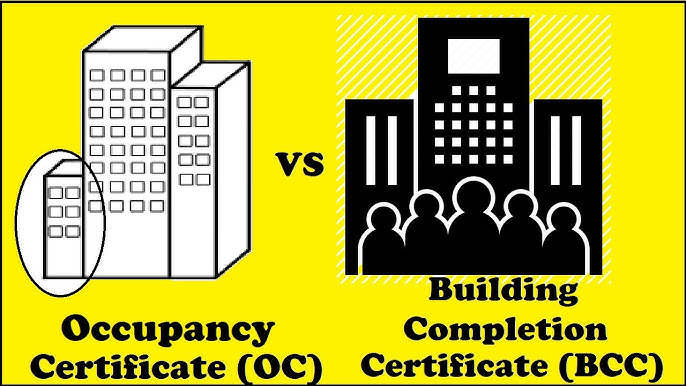When buying a home in India, especially in a metropolitan city like Mumbai, understanding legal documents is as important as picking the right location or builder. Among these critical documents, the Occupancy Certificate (OC) and Completion Certificate (CC) are often confused, yet both play a vital role in confirming the legality and livability of a property.
This blog will walk you through the detailed differences between these two essential certificates and cover everything from how to check occupancy certificates online to risks involved in purchasing a property without them.
Also Read:- Can I Buy Property without Registered on RERA?
What Is an Occupancy Certificate?

An Occupancy Certificate (OC) is a document issued by the local municipal authority or development authority, certifying that the construction of the building has been completed in compliance with the approved building plans and local laws. More importantly, it confirms that the building is now fit for occupancy.
The OC ensures that:
- Basic civic infrastructure like water, electricity, sewage, and fire safety is in place.
- The structure follows permissible FSI (Floor Space Index).
- The builder has followed all the safety and regulatory norms.
Without an OC, occupying the property is considered illegal.
Also Read:- Non Occupancy Charges in Society in Maharashtra in 2025
What Is a Completion Certificate?

A Completion Certificate (CC), on the other hand, is issued by the local development authority or municipal corporation once the construction is completed as per the approved layout plan and building norms.
The CC certifies:
- The building is structurally complete.
- The builder has adhered to the construction plan.
- The property has passed inspections from civic bodies like fire, sanitation, and town planning departments.
The major difference is that CC comes before OC — while CC confirms the construction is done, OC confirms the property is ready to live in.
What Is the Difference Between Occupancy Certificate and Completion Certificate?

Let’s break it down point by point to understand the clear distinctions:
| Feature |
Completion Certificate (CC) |
Occupancy Certificate (OC) |
| Purpose |
Certifies completion of construction |
Certifies suitability for occupancy |
| Issuing Authority |
Municipal corporation or local development body |
Same, post verification of livability |
| Timing |
Obtained after construction is done |
Obtained after civic services are in place |
| Significance |
Mandatory for legal possession transfer |
Mandatory for moving into the property |
| Dependencies |
Requires adherence to the approved layout |
Requires functioning amenities & safety systems |
In short, CC confirms construction legality while OC confirms habitation legality.
Why Is an Occupancy Certificate Important for Homebuyers?
As a homebuyer, having an OC is non-negotiable because:
- Legal Occupancy: Without an OC, occupying your flat is considered unlawful.
- Utility Connections: Many local authorities refuse to give permanent water, power, and gas connections without OC.
- Resale or Rental Restrictions: Future buyers or tenants may avoid properties without a valid OC.
- Loan Disbursement: Many banks will not disburse the final home loan installment unless the OC is submitted.
- Avoid Penalties: Local authorities can fine or even order eviction if residents move in without an OC.
What Are the Risks of Buying Property Without an Occupancy Certificate?
The consequences of ignoring OC while purchasing a home can be severe:
- Eviction Risk: Municipal authorities may declare the building illegal.
- No Home Loan Closure: Banks may withhold the final loan disbursement.
- Insurance Void: Home insurance may not be valid without an OC.
- High Resale Issues: Selling becomes difficult as buyers demand clear legal paperwork.
- Legal Disputes: Can lead to court cases or civic notices.
How to Get an Occupancy Certificate in India?
Here’s how builders or owners can apply for an OC:
- Complete All Construction Work as per approved plans.
- Apply to the Municipal Body (like BMC in Mumbai).
- Submit Required Documents (discussed in the next section).
- Inspection by Officials of fire, water, sanitation, and electricity departments.
- Issuance of OC once the building complies with all regulations.
Time taken: Usually 30 days post-application, if everything is in order.
What Documents Are Required for an Occupancy Certificate?

Here’s a list of the typical documents required:
- Building Completion Certificate
- Copy of sanctioned building plan
- Commencement Certificate
- NOC from the fire and pollution departments
- Photographs of the completed building
- Copy of the building contractor’s license
- Tax receipts from the local body
- Built-up area calculation sheet
Who Issues the Occupancy Certificate in Maharashtra?
In Maharashtra, the following authorities issue the OC:
- Municipal Corporation: For properties within city limits (e.g., Mumbai, Pune, Nashik).
- Metropolitan Region Development Authorities: Like MMRDA, for projects in urban and semi-urban outskirts.
- Municipal Councils and Nagar Panchayats: For smaller towns or semi-rural areas.
Typically, the OC is issued by the Building Proposal Department of these authorities.
How to Check Occupancy Certificate Online?
You can check OC status online by following these steps:
- Visit the official website of your local municipal corporation.
- Go to the section labeled Building Proposal or Property.
- Enter your property details, like survey number or project name.
- Select “Occupancy Certificate” from document types.
- View or download the issued OC.
For example, in Mumbai, you can check OC status on the BMC’s Development Plan portal.
How to Verify the Authenticity of an Occupancy Certificate?
To verify if the OC is genuine:
- Cross-check details like name, address, and property number.
- Match the OC number with the local authority’s records.
- Ensure it has the official seal and signature of the approving authority.
- Visit the municipal office or check their online database.
If the OC is not traceable online or seems altered, report it to the relevant municipal office.
Can You Get a Home Loan Without an Occupancy Certificate?
Most reputable banks do not approve home loans for properties without a valid OC. Even if they sanction the initial loan amount based on the builder’s reputation:
- Final disbursement is usually withheld until the OC is produced.
- In resale cases, loan applications are likely to be rejected if the OC is missing.
- Without OC, the risk profile of the project is high, and banks avoid involvement.
So, while technically possible through non-banking lenders or private financiers, it is not advisable to proceed without an OC.
Conclusion
The Completion Certificate and Occupancy Certificate serve different yet equally essential purposes in the journey of buying a home. While the CC certifies construction legality, the OC proves that a property is livable and legally occupiable.
As a buyer, never overlook these documents. Ask the builder for copies, check their status online, and ensure they are obtained before taking possession. It safeguards your investment, ensures your safety, and avoids legal entanglements.
At Housiey, we make sure you’re never left in the dark. We connect you directly with verified builders, offer end-to-end support, and ensure every property you explore has a clear legal status, including proper certification.
Interested in stylish, open-concept living? Don’t miss our detailed blog on “Loft Apartments” – it’s worth a read!
FAQs
When buying a home in India, especially in a metropolitan city like Mumbai, understanding legal documents is as important as picking the right location or builder. Among these critical documents, the Occupancy Certificate (OC) and Completion Certificate (CC) are often confused, yet both play a vital role in confirming the legality and livability of a property.
This blog will walk you through the detailed differences between these two essential certificates and cover everything from how to check occupancy certificates online to risks involved in purchasing a property without them.
Also Read:- Can I Buy Property without Registered on RERA?
What Is an Occupancy Certificate?

An Occupancy Certificate (OC) is a document issued by the local municipal authority or development authority, certifying that the construction of the building has been completed in compliance with the approved building plans and local laws. More importantly, it confirms that the building is now fit for occupancy.
The OC ensures that:
- Basic civic infrastructure like water, electricity, sewage, and fire safety is in place.
- The structure follows permissible FSI (Floor Space Index).
- The builder has followed all the safety and regulatory norms.
Without an OC, occupying the property is considered illegal.
Also Read:- Non Occupancy Charges in Society in Maharashtra in 2025
What Is a Completion Certificate?

A Completion Certificate (CC), on the other hand, is issued by the local development authority or municipal corporation once the construction is completed as per the approved layout plan and building norms.
The CC certifies:
- The building is structurally complete.
- The builder has adhered to the construction plan.
- The property has passed inspections from civic bodies like fire, sanitation, and town planning departments.
The major difference is that CC comes before OC — while CC confirms the construction is done, OC confirms the property is ready to live in.
What Is the Difference Between Occupancy Certificate and Completion Certificate?

Let’s break it down point by point to understand the clear distinctions:
| Feature |
Completion Certificate (CC) |
Occupancy Certificate (OC) |
| Purpose |
Certifies completion of construction |
Certifies suitability for occupancy |
| Issuing Authority |
Municipal corporation or local development body |
Same, post verification of livability |
| Timing |
Obtained after construction is done |
Obtained after civic services are in place |
| Significance |
Mandatory for legal possession transfer |
Mandatory for moving into the property |
| Dependencies |
Requires adherence to the approved layout |
Requires functioning amenities & safety systems |
In short, CC confirms construction legality while OC confirms habitation legality.
Why Is an Occupancy Certificate Important for Homebuyers?
As a homebuyer, having an OC is non-negotiable because:
- Legal Occupancy: Without an OC, occupying your flat is considered unlawful.
- Utility Connections: Many local authorities refuse to give permanent water, power, and gas connections without OC.
- Resale or Rental Restrictions: Future buyers or tenants may avoid properties without a valid OC.
- Loan Disbursement: Many banks will not disburse the final home loan installment unless the OC is submitted.
- Avoid Penalties: Local authorities can fine or even order eviction if residents move in without an OC.
What Are the Risks of Buying Property Without an Occupancy Certificate?
The consequences of ignoring OC while purchasing a home can be severe:
- Eviction Risk: Municipal authorities may declare the building illegal.
- No Home Loan Closure: Banks may withhold the final loan disbursement.
- Insurance Void: Home insurance may not be valid without an OC.
- High Resale Issues: Selling becomes difficult as buyers demand clear legal paperwork.
- Legal Disputes: Can lead to court cases or civic notices.
How to Get an Occupancy Certificate in India?
Here’s how builders or owners can apply for an OC:
- Complete All Construction Work as per approved plans.
- Apply to the Municipal Body (like BMC in Mumbai).
- Submit Required Documents (discussed in the next section).
- Inspection by Officials of fire, water, sanitation, and electricity departments.
- Issuance of OC once the building complies with all regulations.
Time taken: Usually 30 days post-application, if everything is in order.
What Documents Are Required for an Occupancy Certificate?

Here’s a list of the typical documents required:
- Building Completion Certificate
- Copy of sanctioned building plan
- Commencement Certificate
- NOC from the fire and pollution departments
- Photographs of the completed building
- Copy of the building contractor’s license
- Tax receipts from the local body
- Built-up area calculation sheet
Who Issues the Occupancy Certificate in Maharashtra?
In Maharashtra, the following authorities issue the OC:
- Municipal Corporation: For properties within city limits (e.g., Mumbai, Pune, Nashik).
- Metropolitan Region Development Authorities: Like MMRDA, for projects in urban and semi-urban outskirts.
- Municipal Councils and Nagar Panchayats: For smaller towns or semi-rural areas.
Typically, the OC is issued by the Building Proposal Department of these authorities.
How to Check Occupancy Certificate Online?
You can check OC status online by following these steps:
- Visit the official website of your local municipal corporation.
- Go to the section labeled Building Proposal or Property.
- Enter your property details, like survey number or project name.
- Select “Occupancy Certificate” from document types.
- View or download the issued OC.
For example, in Mumbai, you can check OC status on the BMC’s Development Plan portal.
How to Verify the Authenticity of an Occupancy Certificate?
To verify if the OC is genuine:
- Cross-check details like name, address, and property number.
- Match the OC number with the local authority’s records.
- Ensure it has the official seal and signature of the approving authority.
- Visit the municipal office or check their online database.
If the OC is not traceable online or seems altered, report it to the relevant municipal office.
Can You Get a Home Loan Without an Occupancy Certificate?
Most reputable banks do not approve home loans for properties without a valid OC. Even if they sanction the initial loan amount based on the builder’s reputation:
- Final disbursement is usually withheld until the OC is produced.
- In resale cases, loan applications are likely to be rejected if the OC is missing.
- Without OC, the risk profile of the project is high, and banks avoid involvement.
So, while technically possible through non-banking lenders or private financiers, it is not advisable to proceed without an OC.
Conclusion
The Completion Certificate and Occupancy Certificate serve different yet equally essential purposes in the journey of buying a home. While the CC certifies construction legality, the OC proves that a property is livable and legally occupiable.
As a buyer, never overlook these documents. Ask the builder for copies, check their status online, and ensure they are obtained before taking possession. It safeguards your investment, ensures your safety, and avoids legal entanglements.
At Housiey, we make sure you’re never left in the dark. We connect you directly with verified builders, offer end-to-end support, and ensure every property you explore has a clear legal status, including proper certification.
Interested in stylish, open-concept living? Don’t miss our detailed blog on “Loft Apartments” – it’s worth a read!
FAQs










